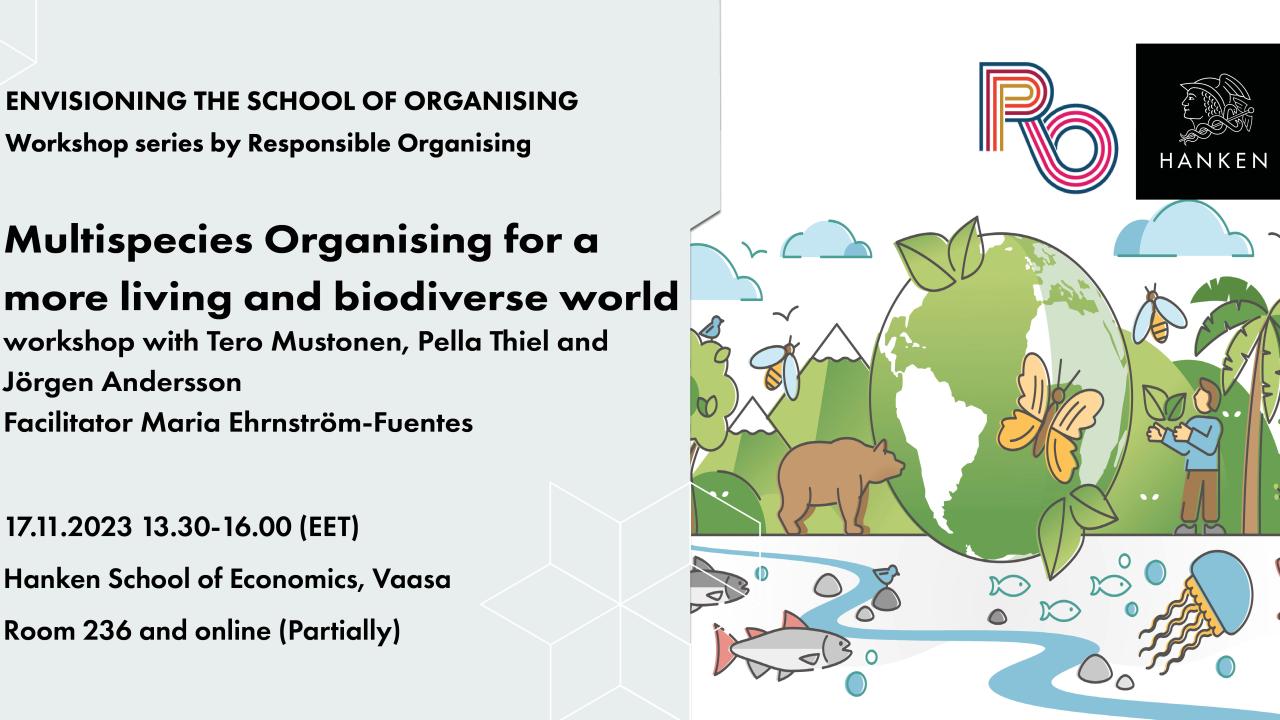Multispecies Organising for a more living and biodiverse

Register here!
Date: 17.11.2023 13.30-16.00
Location: Hanken School of Economics, Vaasa, Room 236
During this workshop we seek answers to the question, what it would mean to ‘take nature seriously’ in teaching, research, and practice in a way that embodies our deepest aspirations for organising for a better world?
Background:
One of the major challenges inherent in all levels of education is that knowledge is divided into different subjects belonging to either the natural sciences without people or the social sciences without nature. Many researchers in sustainability argue that this separation between nature and society is the root cause of ecosystem destruction. Thus, reframing the basic theories about organizations, societies, and nature towards more sustainable ways of living ‘in harmony with nature’ requires major shifts in how we relate to the ‘planetary web of life’, encompassing both us humans and other species.
Content of the workshop:
During the workshop, we will discuss which aspects are important to consider when we reframe our relationship to the ecology and how to embed our management theories and practices within the planetary web of life. How can we frame our role within multispecies organisational contexts in ways that bring forth less destructive and more flourishing pathways towards a sustainable, biodiverse, and living world?
The three invited guest speakers will present their work that involves multiple species in farming, nature conservation, and advocacy for changes in legal frameworks and policy. Based on their experiences of such ecological work, they will give their view of how they have reframed their role in relation to nature through their collaborations with other species and ecologies. After this, participants will be asked to brainstorm about paths forward that can reframe the (nature/society) dualism in the curriculum.
The workshop will be held in person at Hanken School of Economics in Vaasa, with the presentation streamed online. Participants who register for the presentation online will receive a link to Teams.
On the same day, from 12.30-13.00 the speakers will hold a panel discussion at the Science Carnival on the topic "Can man and nature work together to restore the ecological balance?". You can participate either in person at Köpcentrum Rewell or online. For further details, please click here.
Speakers information
Tero Mustonen is the Finnish president and founder of the Snowchange Cooperative, a pan-Arctic and boreal forest network of community associations fighting climate change and biodiversity loss. He also holds a position as an adjunct professor of geography at the University of Eastern Finland. Since April 2018, Tero Mustonen led the restoration of 62 severely degraded former industrial peat mining and forestry sites throughout Finland—totaling 86,000 acres—and transformed them into productive, biodiverse wetlands and habitats. In April 2023, Tero was awarded one of the most prestigious environmental recognitions in the world, the Goldman Environmental Prize, which is also known as the “Green Nobel”.
Pella Thiel is an ecologist, farmer, author, and educator who works with relational, systemic leadership for a society in harmony with nature at all levels, from local resilience to international legal frameworks. Pella is the co-founder of Swedish hubs of international networks like Transition Sweden (part of Transition Network), End Ecocide Sweden (part of Stop Ecocide International), and Save the Rainforest Sweden. She teaches ecopsychology with Lodyn and is a knowledge expert in the UN Harmony with Nature programme. She has been awarded several prestigious environmental awards in Sweden, among others, the Martin Luther King Award (2023) and the Environmental Hero of the Year Opens in new window from WWF Sweden (2019).
Jörgen Andersson is a farmer, educator and the founder of the Noric Savory Institute hub for regenerative agriculture. He has gained his profound knowledge about the wisdom of the land by working with cows and sheep at the Fjällbete farm just outside the ski resort Åre in Sweden. He is active in many different organizations working towards ensuring the highest possible vitality in ecosystems in different geographical contexts. As one of the educators at a course on regenerative agriculture at Bäckedals Folkhögskola, Jörgen contributes to developing knowledge about the collaborations that occur among people and other species when they collectively build vital ecosystems and increase biodiversity both beneath and above the soil while also producing food and other necessities that satisfies the needs of humans.

